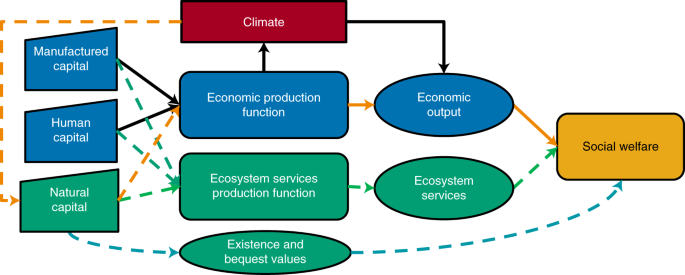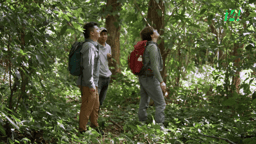Beyond tacos, or why naming matters for sustainability in climate economics
Published in Sustainability

As a Mexican, part of my culture lies in the small variations of how to use a tortilla to prepare different dishes. Roll it, and you get a taco. Bend it, and that's a quesadilla, but if you put salsa on top, it transforms into an enchilada. Names matter indeed.
Naming is the first step to acknowledge that something exists. Even if at the end you end up with the exact same ingredients in your belly, the name, the look, and the order of the ingredients create a unique and irreplaceable experience for each dish. In rhetorical terms, that is what Fran Moore, my co-author, and I did in our research published in Nature Sustainability. We modified a climate-economic model to acknowledge that natural systems provide unique and irreplaceable benefits to society.
In computational models that integrate climate and economy, two fundamental building blocks typically lead to social wellbeing: human capital (labor) and manufactured capital (infrastructure). We added natural capital as a third building block, encompassing the functions and diversity of healthy ecosystems, which at the end of the day provide unique benefits often referred to as ecosystem services: clean air, recreation, and disaster risk reduction, to name a few.
Economists are well aware that human wellbeing is highly dependent on natural systems, however, it often remains unnamed in the guts of the computational models used to calculate the costs of climate change. Luckily, the sustainability accounting literature has been carefully quantifying that in past years. In this paper, we reconcile the most recent findings of both lines of research in a way not currently represented in climate economic models or policy.
Building on recent global quantifications of natural capital, as well as its role on our economy and welfare, we found that the carbon emissions path that maximizes the welfare in the model is consistent with limiting temperature by 1.5 Celsius by the end of the century. This result contrasts with the standard version of the model --the same model that got William Nordhaus his Nobel Prize in 2018 - that recommends only gradual restrictions on emissions, producing warming close to 3 Celsius by 2100.
While others papers have obtained similar results by updating the physics or the economics of this model, this is the first version that includes nature explicitly as a fundamental building block for our society. It is time to go beyond some classical depictions of wellbeing and enrich our models and calculations with the diversity of unique experiences that we value in our daily lives. Because even if tacos rock, I can’t imagine life without quesadillas.
Photo by Monika Izdebska on Unsplash
Follow the Topic
-
Nature Sustainability

This journal publishes significant original research from a broad range of natural, social and engineering fields about sustainability, its policy dimensions and possible solutions.
What are SDG Topics?
An introduction to Sustainable Development Goals (SDGs) Topics and their role in highlighting sustainable development research.
Continue reading announcement


Please sign in or register for FREE
If you are a registered user on Research Communities by Springer Nature, please sign in